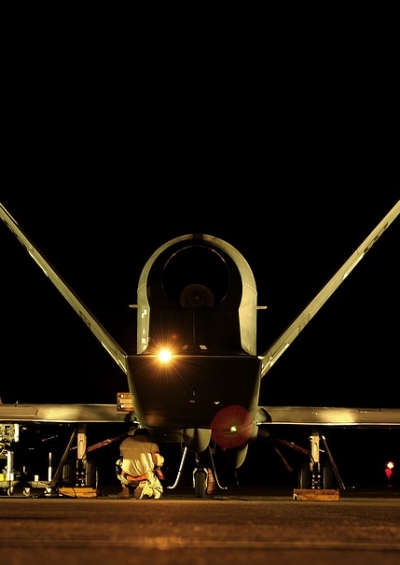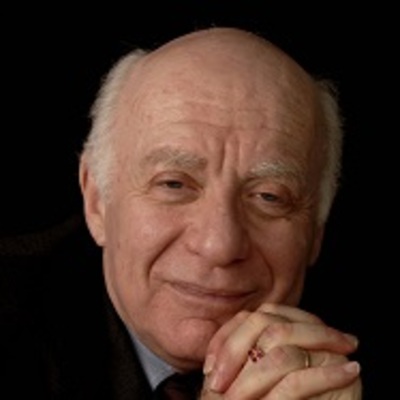US Drones and the Khashoggi Murder
What is the background to the U.S. reaction to the killing of Jamal Khashoggi by the courtiers of Trump family’s close friend, Mohammed bin-Salman?
November 4, 2018

In Washington, there is not much mystery about Mohammed bin-Salman’s (=MBS) behavior. He is an ego-maniac, somewhat unhinged. He is drunk with power and accustomed to torture and kill at whim.
His campaign of annihilation against the Houthis of Yemen indicates the depths of his depravity and the scope of his ambition.
So, too, did his imprisoning of 400 wealthy Saudis in the Riyadh Ritz Carlton where they were physically abused until they coughed up their riches for his personal use (e.g., spending $500 million for a mislabeled “Leonardo” painting). MBS thus presents a good imitation of Caligula and Nero.
So, too, did his kidnapping and physical abuse of the Prime Minister of Lebanon (Saad Hariri) – who owed MBS money and, therefore, political fealty.
MBS: Encouraged by the U.S.
In these ruthless ventures, he has been encouraged by the American government. The Saudi bombing of Yemen to smithereens, literally, could not happen physically without the active participation of the Pentagon.
The U.S. military flies the refueling planes without which MBS’s air force could not reach their targets in Yemen on two-way missions. It also provides the detailed electronic Intelligence critical to the mission.
Never mind that U.S. military personnel sit in the very command rooms from which the operations are conducted. In addition, Washington provides unqualified diplomatic cover and justification.
This Yemen “policy” was inaugurated by Barack Obama and was then continued by Trump. In legal terms, we — the United States — are an accessory before, during and after the fact of MBS’ crimes in Yemen.
What responsibility do we have for the Khashoggi murder?
The United States’s main responsibility lies in helping instill MBS’s deep sense of impunity. In addition, we encouraged the Saudi alliance with Israel. This gave MBS further confidence that active lobbying in Washington and the media would insulate him from any retribution.
Hence, feeling that he protected all his relevant flanks properly, he is now furious that some people in the West (not including the White House) are making such a fuss over the pedestrian act of whacking an annoying critic.
Furthermore, from the Saudi crown prince’s perspective, the United States has set the relevant precedent for the assassination of political enemies. Witness our program of drone killings in Afghanistan, Pakistan, Iraq, Syria, Yemen, Somalia, Libya, Mali, Chad and a number of other countries.
It is hard to deny that, via its drone strike “policy,” the U.S. government has gone a long way toward establishing the de facto legitimacy of extra-judicial murder as a standard combat tactic.
The U.S. as legitimizer of targeted killings
In the United States, this approach is accepted as such. Since targeted assassination involves no U.S. casualties, it makes the prosecution of war more palatable to the U.S. public. That is why is now an integral part of the playbook.
The chain of “command” is as follows: The Israelis inaugurated it. We Americans refined it and extended it. MBS now emulates us. Count on others to follow it.
Of course, the level of inhibition varies from leader and by target. America’s singular influence in setting global “fashions” means that the inhibition will weaken most everywhere and the range of individuals targeted will widen.
Worse than the Middle Ages?
The tactic of knocking-off the enemy’s chief has deep historical roots. In the age of kings and emperors, it was tempting to think of decapitating the opposition.
Normally, it was a vain hope, though. They were out of reach. Also, there was always some inhibition since the prospect of retaliation in kind was unappealing.
There was opportunity when a valiant leader took to the field at the head of his troops – as did Alexander the Great as well as several others. The annals are replete with tales of armies breaking and running when their champion was killed or incapacitated.
Leaderless modern warfare
In contrast, in modern warfare, it is generally felt that no one leader is indispensable – certainly not generals. Think of Afghanistan, where the parade of American commanders now numbers 17, not due to attrition but rather to an odd ritual of rotation.
Anyway, those personnel changes have been a totally irrelevant factor – like quarterbacks for the Cleveland Browns or managers of English football clubs. Robots would have done as well – or as badly. (In WW II, political leaders of extraordinary stature could make a difference: Hitler, Stalin, Roosevelt, Churchill).
Multiple assassinations as a method for thinning the enemies’ leadership ranks is something new. This novel notion has emerged from the endless cogitations on how to eliminate insurgent movements, especially jihadists ones of the Islamic persuasion.
Its net effectiveness is immeasurable to date. It is fair to say that never before in the annals of warfare has a fighting force been found to have so many (nominal) commanders and sub-commanders, treasurers and propaganda chiefs, as recorded on kill lists and successful executions, as among jihadists.
The public reaction in the United States to Khashoggi’s grisly murder reveals some singular features of the prevailing attitude toward morality in foreign policy:
1. The wide difference between the killing of one man in Istanbul and the decimation of thousands in Yemen by the same hand stands out.
2. Anonymous murder on a mass scale is somehow less repugnant than the murder of one readily identifiable person by identifiable individuals.
3. This common human trait is exaggerated by the decision of the mass media to ignore the human suffering in Yemen.
If their fate had been given the same graphic 24/7 publicity as deaths in Aleppo and East Ghouta, it would have registered. In the former case, you had a seemingly black-and-white story line pushed by the U.S. government – however confected – and colorized by the CIA/MI6 agents: The White Helmets. There was neither the political nor commercial motivation to lend the Yemeni atrocities similar treatment.
Does morality still count for Americans?
Despite Trump’s rhetorical pullback, the United States has committed to a strategy of global dominance – by means violent as well as peaceable.
Americans remain wedded to the belief that we are a moral people following the course of righteousness in the world. “When conquer we must, for our cause it is just; let this be our motto: In God is our trust.”
This unthinking mental universe has permitted us so far to perpetuate many myths about our place in the world. But eventually, we must look at the dark truth: The America that so many people around the globe looked to for guidance in seeking enlightened political truth has become the model and inspiration for those who seek to evade it.
Takeaways
What is the background to the US reaction to the killing of Jamal Khashoggi by the courtiers of Trump family’s close friend, Mohammed bin-Salman?
The US’s main responsibility lies in helping instill MBS’s deep sense of impunity.
The US has set the precedent for the assassination of political enemies. Witness our program of drone killings in Afghanistan, Pakistan and Iraq.
Via its drone strike “policy,” the US has gone a long way toward establishing the de facto legitimacy of extra-judicial murder as a standard combat tactic.
The America that so many people around the globe looked to for guidance in seeking enlightened political truth has become the model and inspiration for those who seek to evade it.
